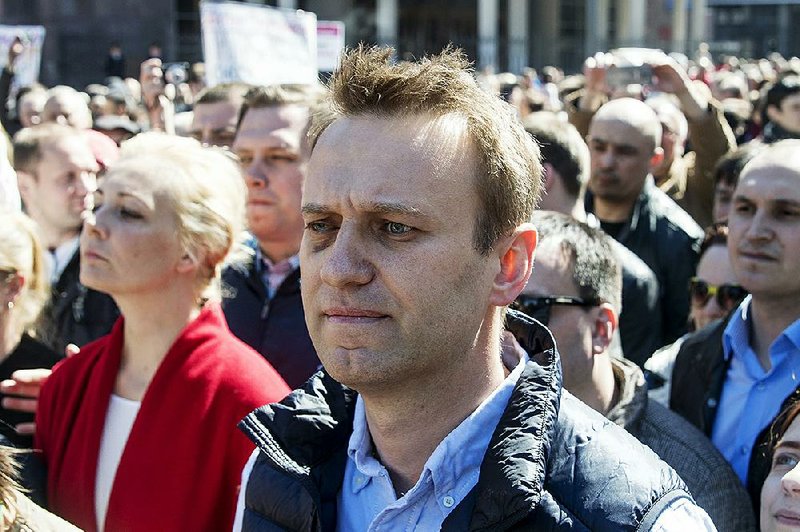MOSCOW -- Thousands of people jammed the Russian capital to protest a plan to demolish decades-old apartment blocks housing more than a million people, delivering a new challenge for President Vladimir Putin.
About 20,000 people rallied Sunday in Sakharov Prospect in Moscow's downtown, according to an activist group that monitors attendance at demonstrations. Police, who stopped Russian opposition leader Alexey Navalny from joining the protest, said 8,000 took part.
Russia in March witnessed the biggest anti-government demonstrations in five years, with 60,000 people turning out in more than 80 cities to protest corruption amid falling living standards after the longest recession in two decades. The rise in civic activism comes as Putin faces an uphill task to retain people's support because of the economic squeeze. Putin, 64, is expected to seek another six-year term next March.
Faced with resistance to Moscow Mayor Sergei Sobyanin's initiative to tear down 8,000 aging apartment buildings with 1.6 million tenants, the authorities cut the scale of the demolition to 4,500 buildings with 1 million residents. But protesters say the law working through the parliament to enact the resettlement is so vague, any house can be designated for demolition.
They accuse authorities of rushing the legislation to favor the interests of Moscow property developers that are close to City Hall and have suffered from a recent slump in real estate prices.
The State Duma rushed to pass the first reading of a bill on the demolition in Moscow last month. If the bill passes, it will force the residents in what City Hall says are dilapidated blocks to vacate their apartments in exchange for other housing. However, opponents say some of the structures proposed for demolition are actually good-quality apartment buildings in what have recently become expensive neighborhoods.
Faced with growing criticism, the parliamentary speaker suggested postponing the second reading pending a public debate.
"The main aim is business, to seize the land and make money by selling apartment buildings," said Vadim Glushkov, a 44-year-old engineer who like many at the rally said it was the first time he had taken part in a protest.
Under the draft law, property owners will get apartments in new housing of the same size -- but not the same value -- in their district or a neighboring one. This is feeding fears that instead of living in low-rise, five-story homes in green, residential spaces in Moscow, they'll be rehoused in vast skyscrapers on the outskirts of the city.
The so-called Khrushchevki were built in a construction program that Soviet leader Nikita Khrushchev began in 1955 to rehouse families in apartments of their own rather than sharing crowded communal flats. While many buildings are in disrepair, owners have spent money on renovating their properties.
Alexei Matveyev, a 36-year-old bank clerk from a north Moscow neighborhood, carried a placard reading "No to violation of the constitution and property law." He said the bill under discussion is rushed and disregards residents' interests.
"People who live in these blocks bought the apartments in order to live in quiet leafy low-rises," Matveyev said. "We are happy in our house. We don't want to live in tower blocks."
Alexander Zeinin, 32, and his wife Natalya bought an apartment in Perovo, in the city's east, several years ago to start a family but now their building is slated for demolition.
"We spent a year and half on the remodeling. Why would I want to go anywhere?" Zeinin said. "We haven't had a good sleep these past two months. We're recently married and now we think if we can have children -- what if they throw us onto the street tomorrow?"
Tatiana Malova, 54, one of the protesters, said she's been a loyal Putin supporter but will choose how to vote next year based on whether he listens to the people and cancels the proposed law.
"What's scary is the speed at which they're doing it," she said, pointing out that residents will have only a month to vote on the plan from mid-May. With officials distributing glossy brochures showing elite modern blocks that people can move into, if the plan is backed by a majority of homeowners, those who refuse to move out will be forcibly evicted.
Information for this article was contributed by Henry Meyer and Irina Reznik of Bloomberg News and by Nataliya Vasilyeva of The Associated Press.
A Section on 05/15/2017
